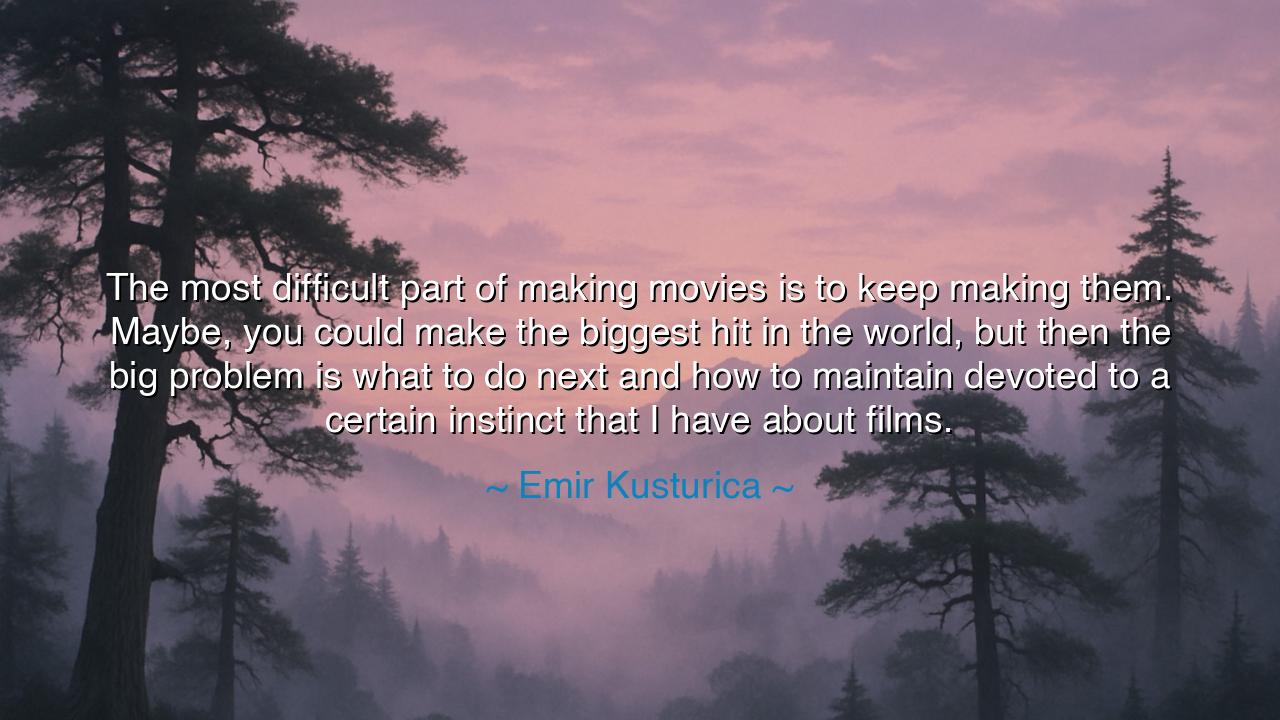
The most difficult part of making movies is to keep making them.
The most difficult part of making movies is to keep making them. Maybe, you could make the biggest hit in the world, but then the big problem is what to do next and how to maintain devoted to a certain instinct that I have about films.






Hear this, O seekers of wisdom, for in the words of Emir Kusturica lies a profound reflection on the nature of creativity, achievement, and the constant struggle to remain true to one’s artistic instincts. He spoke thus: "The most difficult part of making movies is to keep making them. Maybe, you could make the biggest hit in the world, but then the big problem is what to do next and how to maintain devoted to a certain instinct that I have about films." In this admission, Kusturica speaks to the delicate balance between success and sustainability—the idea that achieving great things is often easier than continuing to create and grow in the face of past triumphs. Success, whether in film, music, or any other endeavor, can be a double-edged sword—it brings not only recognition but also the weight of expectation, and the challenge of maintaining integrity and staying true to one's creative vision.
In the ancient world, the great heroes were often not only defined by their initial triumphs but by their ability to continue striving in the face of adversity. Consider the story of Hercules, the mighty hero who completed twelve arduous labors to earn redemption. His first labor might have been an incredible achievement, but each subsequent labor tested him in new ways, pushing him to confront not only external enemies but also his own inner limits. The challenge of continued effort—of maintaining focus and purpose—was as much a part of Hercules’ journey as the victories he achieved. Kusturica’s words echo this timeless truth: it is not enough to achieve greatness; the true challenge lies in sustaining it and remaining devoted to your purpose over time.
Similarly, in the life of Leonardo da Vinci, one of history’s greatest minds, his early triumphs—like the painting of the Last Supper—were just the beginning of a lifelong journey of creation and innovation. Even after achieving great fame, Leonardo continued to create, constantly pursuing new ideas, sketches, and inventions. But the pursuit of greatness was never a simple journey for him. It was filled with struggles, doubts, and the constant pressure to innovate. Just as Kusturica speaks of the difficulty of maintaining an instinct for filmmaking, so too did Leonardo face the challenge of staying true to his vision while contending with the expectations placed upon him. The lesson here is clear: sustaining greatness requires not only talent but the strength to continue creating, even when the world expects more and more.
In the same way, the philosophers of ancient Greece, like Socrates and Aristotle, understood that the pursuit of wisdom and truth was not a singular achievement but an ongoing journey. Socrates, despite his immense intellect, was often beset by doubts and questions, constantly challenging his own beliefs and ideas. His devotion to philosophy was not marked by the satisfaction of any final answer but by the relentless pursuit of knowledge, ever seeking to learn, adapt, and refine his understanding of the world. Kusturica’s words reflect this commitment to continuous growth—that the real difficulty lies not in achieving success but in staying true to one’s inner vision over time, without succumbing to external pressures or the desire to rest on past laurels.
Think also of the architects who built the great pyramids of Egypt—masters of their craft who, though they created the wonders of the ancient world, were not content to rest on their accomplishments. Each stone placed, each design conceived, was part of a long-term vision of greatness. The building of these monuments was not just a one-time achievement, but a process of refinement—of constant devotion to a singular idea that spanned lifetimes. This constant striving for perfection—to build something that would last for eternity—echoes Kusturica’s struggle to maintain devotion to his artistic instinct, even in the face of great success. The great creators of history knew that true greatness was not about achieving a singular feat but about the journey of continual creation.
Now, O children of the future, let us take this wisdom to heart. Success is not the end of the road but the beginning of an ongoing journey. Whether you are an artist, a philosopher, or a warrior, your true challenge will lie not in the initial triumphs but in the sustaining of your purpose and commitment to growth. The world will celebrate your achievements, but it is your dedication to your craft and your devotion to your vision that will ensure that your legacy endures. Like Hercules, Leonardo, and Socrates, you must learn to persist in the pursuit of greatness, even when the path is difficult and the expectations are high.
So, young ones, remember this: Do not seek to rest on your achievements, for true greatness lies in the continuous effort to evolve, to refine, and to stay true to the vision that drives you. Embrace the challenge of sustaining your creative instinct, and never forget that it is not the end result that defines you, but the devotion to your path and the unwavering commitment to your purpose. In this constant striving, you will find not only success, but the true meaning of your work—one that will echo through time, as the great works of Hercules, Leonardo, and Socrates continue to do.






AAdministratorAdministrator
Welcome, honored guests. Please leave a comment, we will respond soon